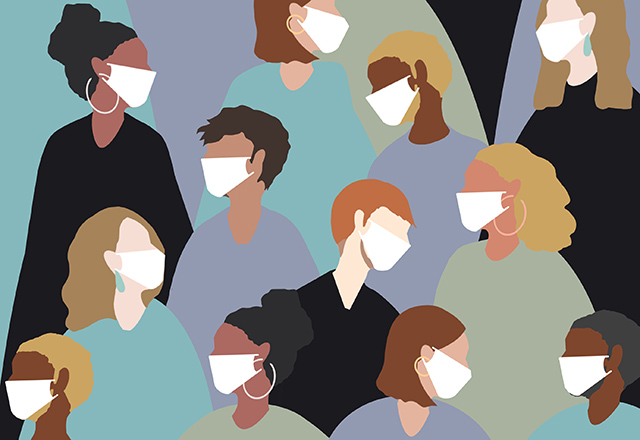How can I help? That was the thought crossing the minds of many members of the Hopkins community when the coronavirus pandemic began to take hold of society in early March. Brooke Jarrett, a third year Ph.D. candidate in the School of Public Health had this thought herself. She was earning her Master’s degree during the 2015 Zika outbreak, and since then had regretted not becoming more involved. This time, she decided to take action. Dr. Justin Lessler, professor in the Center for Global Health, asked her “Can you code? Or can you speak Mandarin?”. After responding “no” for each, he asked what her strong skills were – Jarrett replied she was good at writing and organizing. Soon after, Lessler put Jarrett in touch with Drs. Kate Grabowski and Emily Gurley, who were in the embryonic stages of forming a team to curate literature on the novel coronavirus.
Dr. Grabowski works with the Infectious Disease Dynamics Group, and Dr. Gurley leads the Student Outbreak Response Team (SORT), both at the School of Public Health. The teams had been keeping track of new developments in the pandemic and were looking for ways to review key literature for clinicians at the School of Medicine as well as local health departments. After receiving funding from the School of Public Health and Bloomberg philanthropy, the two were able to begin assembling a team and turning their vision into something larger and more public facing. “This effort is at the interface between academia and applied public health… it’s a way to make a real impact,” says Gurley.
The group, which later gained the title of Novel Coronavirus Research Compendium (NCRC), is comprised of eight different teams. The teams, now coordinated by Jarrett, focus on diagnostics, modeling, epidemiology, pharmaceutical interventions, non-pharmaceutical interventions, clinical presentation & prognostic risk factors, vaccines, and ecology & spillover. Using key search terms specific to each discipline, informationists at the Welch Library pull the latest literature from PubMed and several pre-print servers (MedRxiv, BioRxiv, and SSRN). In addition to this, the group keeps its eyes peeled for new research appearing in the news and on social media. Each team then reviews papers in their area, summarizes the main points and value added and writes an “expert summary sheet” to inform decision making in public policy, healthcare, and research.
The 40+ members of the Compendium include faculty, fellows, graduate students, and alumni that span six different institutions/affiliations: Johns Hopkins University, University of Florida, Boston University, Imperial College London, Harvard University, and the Office of Naval Research. Austin Peer, a medical student at Hopkins and member of the NCRC’s pharmaceutical interventions team, was also eager to help during the current pandemic. Having worked with Dr. Grabowski for his scholarly concentration, he was happy to join her team. “As the pandemic spread and our clinical rotations were cancelled, I began looking for ways to support both local and global efforts to combat COVID-19,” said Peer. “The compendium was an opportunity to help sift through the newly burgeoning body of literature on SARS-Cov-2 to better serve public health professionals, and the chance to provide reliable reviews in an age of misinformation felt especially critical.”
I myself am a member of the vaccines team, and certainly agree with Peer’s sentiments. Feeling helpless at home, I found this to be a perfect way to remain safely socially distanced while implementing a skill set that I possessed which could be helpful during the COVID-19 pandemic. The process of reviewing articles hot off the press and the latest vaccine trial protocols has made me acutely aware of the breadth of coronavirus research occurring all over the world, as well as the need to curate this literature for the public because there is simply so much of it. “Peer review in any form is an intensive effort and has largely been done for free,” says Grabowski. “This process has underscored for me how much effort goes into accurately reviewing and understanding literature.”
Within a week of its launch, the website had racked up over 3,000 visitors, in addition to its Twitter account amassing over 1,000 followers. Now that the group is gaining momentum, the site will be updated multiple times per week with new expert summaries, and the Twitter account will be posting themed spotlights on specific topics. The work of the NCRC is useful not only for healthcare workers, researchers, and policy makers, but also anyone in the general public who is interested in learning more and keeping current. Anyone may submit a paper that they would like to request to be reviewed by emailing [email protected]. Drs. Grabowski and Gurley hope for the project to continue to help the community, and are eager to secure more funding to allow the Compendium to endure the pandemic.
Related content
- Ways in Which We Can Help Throughout the Coronavirus Pandemic
- Johns Hopkins Medical Students Create Campaign to Confront COVID-19 Rumors with Facts
- Partnering Toward Discovery Goes Virtual
Want to read more from the Johns Hopkins School of Medicine? Subscribe to the Biomedical Odyssey blog and receive new posts directly in your inbox.

Pingback: Progeria Effects in Cells Improved with an Antioxidant Found in Broccoli – Biomedical Odyssey
Comments are closed.